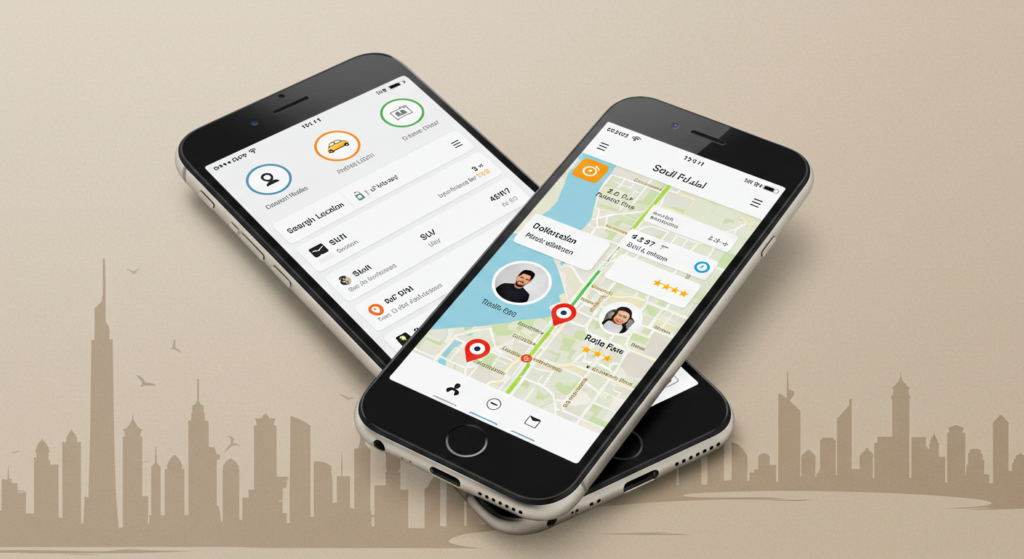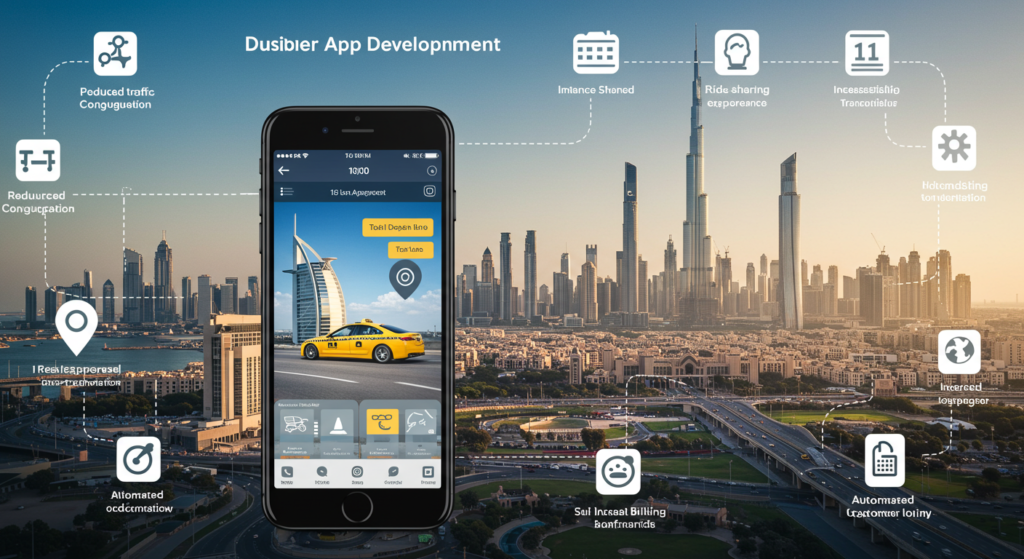The growing interest in taxi app development in Dubai is fueled by the city’s fast-paced lifestyle, expanding infrastructure, and rising demand for convenient transportation. Both residents and visitors now expect their daily commutes to be fast, safe, and accessible at the tap of a screen. That expectation has turned taxi booking app development into a key investment area for businesses aiming to stay relevant in the city’s competitive market.
What’s changing is not just how people move, but how they interact with everyday services. Commuters prefer solutions that reduce wait times, eliminate cash handling, and offer precise arrival estimates. These are no longer special features; they’re baseline expectations. The shift toward mobile-based experiences is already visible across sectors where businesses rely on apps to manage service flow, customer communication, and operational control. Many of these changes are part of how Dubai’s economy is adapting to mobile-first demands, as shown through the growing reliance on mobile app development in Dubai to manage real-time interactions and improve service availability.
Taxi app development services now aim to deliver more than booking functionality. Many businesses are adding features that support different languages, allow scheduled rides for airport pickups, offer real-time customer service chat, and help passengers locate charging stations for hybrid or electric fleets. The trend is leaning toward purpose-built apps that serve distinct groups, daily commuters, tourists, corporate travelers, without overcomplicating the interface.
In Dubai’s climate of constant change and tech adoption, creating a smart and responsive taxi app isn’t just about filling a gap; it’s about staying prepared for what transportation will look like tomorrow.
Future of Taxi App Development in Dubai

The future of taxi app development in Dubai is closely tied to the city’s larger push toward becoming one of the most technologically advanced urban ecosystems in the world. With initiatives focused on smart mobility, electric vehicle integration, and seamless urban connectivity, Dubai is laying the groundwork for digital-first transportation experiences. As user expectations continue to grow around real-time tracking, safety, personalized services, and cashless convenience, taxi app development services are adapting quickly to stay ahead of demand.
One of the emerging directions in this space is the deeper integration of AI and predictive analytics. These features help reduce passenger wait times, suggest optimal routes to drivers, and even forecast ride demand based on time, location, and traffic conditions. Beyond convenience, this data-driven approach supports environmental goals by lowering unnecessary mileage and fuel consumption.
The rise of connected vehicles, autonomous transport pilots, and sustainable mobility options is influencing how new taxi booking app development projects are being planned. Developers are focusing more on long-term scalability and city-level compliance rather than just user-side UX. Fleet operators, ride-sharing startups, and investors are looking for systems that can manage driver behavior, payment automation, and vehicle health monitoring within a single ecosystem.
The city’s expanding digital infrastructure supports this direction well. As mobile solutions become the go-to interface for public and private services, the role of application performance, security, and backend flexibility is taking center stage. This is where the expertise around mobile development in Dubai becomes critical, especially when solutions are built to support thousands of users across multiple locations and evolving service tiers. The ability to maintain performance under growing user loads while supporting custom logic, real-time APIs, and flexible payment integrations is shaping how forward-looking taxi app development companies are approaching new builds.
With Expo City, Dubai Silicon Oasis, and other smart districts gaining momentum, the next generation of Uber-like taxi app development will likely feature deeper city connectivity, multilingual accessibility, AI-driven decision-making, and hybrid mobility solutions. Businesses that invest early in flexible, modular, and secure mobile infrastructure will be best positioned to serve this fast-evolving landscape.
Current Taxi Industry Market
Dubai’s taxi industry is a dynamic and growing sector, driven by urban expansion, tourism, and a demand for efficient transportation. The Roads and Transport Authority (RTA) oversees much of the public fleet, yet private players and ride-hailing services are playing an increasingly important role. As of now, there are over 11,000 taxis operating under the RTA umbrella, complemented by growing private fleets and app-based ride services that cater to different segments of the population.
The market shift toward on-demand taxi app development has been fueled by user demand for faster response times, real-time updates, and transparent pricing. Tourists, residents, and business travelers alike now expect to book a ride within seconds using mobile devices. This shift is not simply about convenience; it’s reshaping the core of urban transport planning and how companies interact with customers. In this climate, taxi booking app development is becoming essential for businesses that want to maintain competitiveness and market relevance.
The same reliance on real-time access and mobile-first engagement is visible in other sectors undergoing rapid transformation. For instance, property companies in Dubai have adopted app-based services to streamline everything from property viewings to booking consultations, demonstrating how technology is simplifying traditional industries. These evolving user behaviors, particularly in sectors like real estate, show how convenience and speed are becoming deciding factors in customer satisfaction and retention.
In transportation, this expectation translates directly into how taxi app development in Dubai is being approached today. From basic ride-hailing to specialized service models including female-only rides, luxury chauffeurs, and electric vehicle fleets, the app-based model is becoming the backbone of Dubai’s next-generation taxi services. Developers and investors who recognize this shift early are building products that go beyond functionality; they’re building systems that fit into the way Dubai moves.
Boost your taxi business with custom apps in Dubai.
Enhance taxi services, boost rider engagement, and streamline operations with custom taxi app development in Dubai.
Features of a Taxi Booking App

In a rapidly evolving mobility market like Dubai, the success of a taxi booking app development project hinges on the inclusion of the right features, those that align with user expectations and deliver operational efficiency. Riders expect intuitive interfaces, speed, and full control over their journeys, while service providers need powerful back-end tools to manage fleets and optimize performance. Below are the key features every taxi app development service should focus on building and refining.
On-Demand Cab Reservation
This is the cornerstone of on-demand taxi app development. It allows users to request a ride anytime, from anywhere, without prior scheduling. In real-time, the system locates the nearest available driver, calculates ETA, and initiates the trip, all within seconds. In a high-density city like Dubai, where punctuality and convenience drive app usage, a well-optimized on-demand reservation system dramatically improves user retention. For a business, it increases trip volume and ensures maximum fleet utilization during peak hours.
Registration or Login
User authentication should be seamless, secure, and fast. A modern taxi app development company typically includes multiple sign-up and login options, such as mobile number with OTP, social login (Google or Apple), or email with password. Additional security features like biometric login (fingerprint or face ID) can improve trust and repeat usage. Beyond convenience, a smart login system helps operators manage rider profiles, ride history, and payment preferences from a central backend.
Vehicle Tracking
Real-time vehicle tracking is critical for both user experience and backend logistics. GPS integration helps riders monitor the exact location of their assigned vehicle before and during the trip. Meanwhile, service providers gain insights into driver behavior, average trip times, and route optimization. Taxi app development services that support live map feeds and geofencing can also trigger alerts when drivers go off route or stay idle too long, which enhances both safety and efficiency.
Rating & Review
Feedback mechanisms offer users a way to express satisfaction or raise concerns after each ride. These ratings directly influence driver performance evaluations, promotions, or potential removal from the platform. For customers, it creates a sense of control and accountability. When managed well, this feature serves as an ongoing quality assurance system, helping the taxi app development company identify areas needing attention without manual oversight.
Customer Support
Responsive support is essential to a successful taxi booking app development experience. In-app customer support options like live chat, support tickets, or direct call buttons ensure users feel heard and protected, especially in cases involving payment errors, driver misbehavior, or lost items. Emergency buttons with GPS sharing also boost user confidence, especially for solo travelers or night-time riders. For businesses, this reduces churn and creates a reputation for being reliable and rider-focused.
Payment Gateway
Integrating a reliable and flexible payment gateway ensures smooth transactions and builds trust. In Dubai’s multicultural economy, apps should support local options (like Emirates NBD and Apple Pay) as well as international cards. Users expect real-time fare breakdowns, tip options, automatic billing, and digital receipts. A feature-rich gateway simplifies revenue tracking and helps operators manage earnings, refunds, and commissions through a centralized dashboard, an essential aspect of high-functioning taxi app development services.
Booking History
For users, access to booking history makes rebooking favorite drivers or routes convenient. It also provides transparency in spending and travel logs, which is especially useful for business users submitting expense claims. For administrators, this data becomes valuable for analytics, identifying high-demand times, rider frequency, or behavior trends. Booking history is also a foundation for loyalty programs and personalized offers, enhancing long-term engagement.
From ride initiation to post-trip feedback, every feature in a taxi app plays a role in building trust, usability, and competitive advantage. Development teams that focus on scalable, modular builds with these features at the core tend to create apps that last in the market, not just trend.
Many of the real-world lessons in structuring these feature sets are reflected across Digital Software Labs blogs, where app development strategies are shaped by use-case depth, market behavior, and technical performance. These insights consistently point to one truth: success in taxi app development isn’t just about being first, it’s about being the most functional and reliable at every touchpoint.
Types of Taxi App Development for Dubai
Dubai’s rapidly expanding urban infrastructure and smart city initiatives have led to diversified demands in the transportation sector. As a result, mobile app development in Dubai has evolved beyond traditional taxi services. Let’s break down the most popular and emerging types of taxi app development being adopted across the region.
Taxis for Women
In a city that prioritizes safety and comfort, taxis for women have emerged as a specialized segment. These apps are developed to ensure female passengers feel secure while commuting, especially during late hours or while traveling solo. The app development cost in Dubai for this category is relatively modest if built on a standard ride-hailing framework, but may increase with advanced features like live tracking, emergency SOS, or driver background verification. With growing demand, mobile app development companies in Dubai are actively offering tailored solutions for gender-specific ride services.
Healthcare Taxi
Healthcare taxi apps focus on patient-friendly rides for hospital visits, elderly transport, and medical emergency travel. These apps are integrated with features like stretcher access, medical staff availability, and route optimization for hospital locations. The mobile app development cost UAE developers charge depends on whether the app is standalone or linked to hospital management systems. It’s an impactful sector where Dubai app development is aligning technology with social wellbeing.
Bike Taxi
Bike taxis have become a practical solution for single riders navigating dense traffic in areas like Deira or Bur Dubai. These apps are lightweight, cost-efficient, and quick to build compared to car taxi apps. For startups looking to enter this market, the app development Dubai scene provides flexible options with lower app development cost in Dubai. Moreover, such apps suit users looking for budget-friendly alternatives, especially when combined with an ecommerce app development cost logic for wallet or top-up integration.
Shuttle Transportation
Shuttle apps focus on fixed-route shared rides, mostly catering to office employees, students, or tourists. These require route management, batch bookings, and bulk pricing models. The mobile app development cost increases when real-time seat tracking and route predictions are added. A capable mobile app development company in Dubai would typically recommend a modular architecture to manage a growing fleet of data and recurring users.
Delivery Services
In many cases, taxi fleets are now doubling as logistics support. A taxi app developed for delivery services includes parcel tracking, driver-rider OTP authentication, and weight-based pricing calculators. Given its proximity to ecommerce app development cost structures, the overlap helps reduce development time and cost. The mobile app development Dubai market has already responded with several hybrid models offering both ride and delivery options through a single interface.
Luxury Vehicle Renting
From limousines to sports cars, luxury vehicle rentals require a highly polished user interface, dynamic pricing engines, and support for concierge features. Since these apps cater to high-net-worth individuals and tourists, the iOS app development cost and Android cost differ depending on platform priorities. A premium UI/UX also adds to the mobile app development cost UAE agencies will quote for this niche.
Online Car Rental App
An online car rental app offers self-drive services through hourly or daily rentals. These applications must integrate calendar-based scheduling, secure payment processing, and user verification modules. Since such services often require advanced backend systems, the mobile app development company in Dubai you choose will play a big role in balancing development cost with reliability and speed. Depending on the fleet size and required features, the app development cost in Dubai estimates for rental apps can range significantly.
Taxi App Development Benefits

Building a customized taxi app development solution can significantly transform how transportation services operate and interact with users. From improving operational performance to creating stronger customer connections, the benefits of adopting advanced taxi app development services are wide-ranging and measurable.
Increased Revenue
One of the most immediate benefits of taxi app development is the opportunity to boost revenue through automation, broader reach, and optimized pricing models. With a well-built app, service providers can accept more bookings simultaneously, reduce downtime between rides, and implement dynamic fare structures based on location, time, or demand. These systems allow companies to make real-time decisions that directly affect profit margins, making on-demand taxi app development an effective strategy for maximizing earnings.
Improved Customer Satisfaction
Riders expect convenience, transparency, and control, and taxi booking app development delivers on all three. Features like real-time tracking, accurate ETAs, easy payment processing, and driver reviews help build trust and remove friction from the user journey. When users can rely on the app to handle everything smoothly, from registration to post-ride feedback, overall satisfaction improves. High ratings, strong reviews, and positive word of mouth naturally follow when businesses focus on seamless customer experiences through intelligent taxi app development services.
Enhanced Efficiency
Efficiency in fleet management, route planning, and dispatching improves significantly with customized taxi app development. Real-time analytics, automated workflows, and intelligent driver allocation help reduce idle time, fuel waste, and manual intervention. This not only lowers operating costs but also ensures quicker ride assignments and faster response times. The streamlined communication between users, drivers, and administrators creates a well-orchestrated operation that scales smoothly as demand increases.
This level of operational control becomes possible through a strong enterprise development solution that connects intelligent allocation systems, centralized dashboards, and real-time analytics. By building on robust enterprise-level infrastructure, taxi services can scale quickly while maintaining fast response times, reducing operational friction, and improving the overall user experience from driver dispatch to passenger drop-off.
Safety Improvement
Safety is a core priority in modern on-demand taxi app development. Apps today include emergency features like SOS buttons, real-time trip sharing, driver ID verification, and background checks to ensure passenger peace of mind. From the driver’s side, vehicle condition tracking and alert systems also contribute to safety compliance. These proactive safety mechanisms enhance public trust, reduce liability, and create a secure environment for all parties involved in the ride.
Customer Loyalty and Engagement
Loyalty programs, promo codes, push notifications, and referral rewards are easy to manage through smart taxi app development services. By giving riders incentives to return and engage with the app regularly, companies can reduce churn and boost lifetime value per user. The ability to personalize promotions based on ride frequency, user location, or travel behavior also leads to stronger brand connections and better customer retention.
FAQs:
A taxi booking app is a mobile-based solution that allows users to conveniently book rides from nearby drivers in real time. It connects passengers with taxi services through a centralized system that includes live GPS tracking, fare calculation, digital payments, and driver reviews. With features like ride history, route monitoring, and customer support, it eliminates the need for traditional hailing or phone-based bookings. In regions like Dubai, where urban mobility is crucial, these apps are central to modern on-demand taxi app development strategies focused on speed, safety, and user control.
The taxi app development cost in Dubai can vary widely based on factors like app complexity, number of features, platform compatibility (iOS, Android, or both), and backend infrastructure. A basic version may start around AED 80,000–100,000, while a fully-featured solution with advanced analytics, real-time fleet management, and multilingual support can exceed AED 250,000. When working with an experienced taxi app development company, pricing often includes post-launch support, UI/UX design, and system scalability. For businesses targeting Dubai’s competitive transportation market, investing in quality taxi app development services is key to long-term success.
Modern taxi booking app development isn’t limited to ride-hailing. Innovative features can set your app apart and attract more users. Some high-value additions include:
- AI-based route optimization to reduce wait times.
- Driver fatigue alerts and vehicle health monitoring.
- Multilingual support for international users.
- In-app emergency buttons with real-time location sharing.
- EV (electric vehicle) fleet integration with nearby charging station visibility.
- Voice-enabled booking for enhanced accessibility.
- Wallet and rewards systems to encourage repeat use.
Integrating these into your taxi app development process ensures the app remains competitive in fast-paced markets like Dubai, where personalization, safety, and digital convenience are essential to user engagement.




